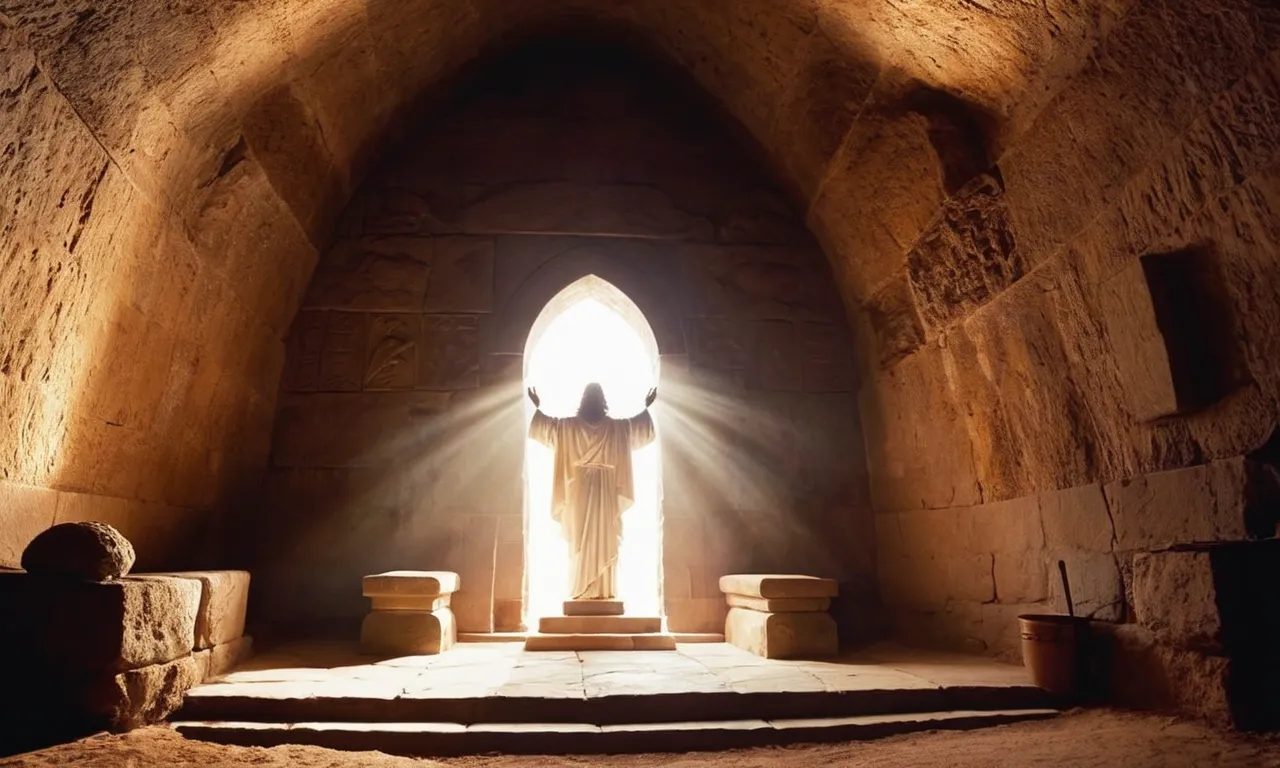The Profound Meaning Of ‘Jesus Has Risen’
In the annals of human history, few phrases have carried as much weight and significance as ‘Jesus has risen.’ This powerful declaration, uttered by the followers of Christ, has echoed through the ages, shaping the course of civilizations and inspiring billions of believers worldwide.
If you’re short on time, here’s a quick answer to your question: The phrase ‘Jesus has risen’ refers to the central belief in Christianity that Jesus Christ, the Son of God, rose from the dead three days after his crucifixion, conquering death and offering the promise of eternal life to those who believe in him.
In this comprehensive article, we will delve into the profound meaning of ‘Jesus has risen,’ exploring its historical context, theological implications, and enduring impact on the Christian faith. We will examine the events surrounding the resurrection, the significance of this miraculous event, and its role in shaping the beliefs and practices of Christianity.
The Historical Context of the Resurrection
The resurrection of Jesus Christ is a pivotal event in Christian theology and history. To fully comprehend its profound meaning, we must delve into the historical context surrounding this extraordinary occurrence.
The narrative unfolds with the Crucifixion of Jesus, a tragic yet redemptive act that set the stage for the miraculous resurrection.
The Crucifixion of Jesus
According to the Gospels, Jesus was arrested, subjected to a sham trial, and ultimately sentenced to death by crucifixion, a brutal form of execution reserved for the most heinous criminals during the Roman era.
This harrowing event took place in Jerusalem, where Jesus was nailed to a cross and left to die a slow and agonizing death. His crucifixion was a pivotal moment in history, fulfilling ancient prophecies and setting the stage for the miraculous events that were to follow.
The Empty Tomb
Three days after his crucifixion, the Gospels recount that a group of women, including Mary Magdalene, visited Jesus’ tomb only to find it empty. This shocking discovery was the first indication that something extraordinary had occurred.
According to a Biblical Odyssey article, the empty tomb is a central element in the resurrection accounts, as it serves as physical evidence that Jesus’ body was no longer present in the tomb where it had been laid.
Eyewitness Accounts of the Risen Christ
The New Testament provides numerous accounts of individuals who claimed to have witnessed the risen Christ after his crucifixion. These eyewitness testimonies are crucial to understanding the historical context of the resurrection.
According to a study by Gary Habermas, a renowned scholar on the resurrection, there are at least 14 different sources that mention eyewitness accounts of the risen Jesus, including the Gospels, the book of Acts, and the writings of Paul. These accounts describe encounters with Jesus in various settings, from the road to Emmaus to the Upper Room, where he appeared to his disciples.
The historical context surrounding the resurrection of Jesus is rich and multifaceted. From the Crucifixion to the Empty Tomb and the numerous eyewitness accounts, these events have captivated believers and scholars alike for centuries.
As we delve deeper into this profound story, we gain a greater appreciation for the impact it has had on the world and the enduring faith it has inspired. 😇🙏
The Theological Significance of ‘Jesus Has Risen’
The proclamation “Jesus has risen” resounds as the cornerstone of Christian faith, echoing through the ages with profound implications. This triumphant declaration carries immense theological weight, serving as a testament to the fulfillment of ancient prophecies, the atonement for humanity’s sins, and the promise of eternal life.
Let us delve into the depths of this transformative truth.
The Fulfillment of Prophecies
The resurrection of Jesus Christ stands as the ultimate validation of His divine mission and the fulfillment of countless prophecies foretold in the Old Testament. From the prophetic words of Psalm 16:10 to the symbolic foreshadowing of Jonah’s three days in the belly of the great fish, the Scriptures pointed to the Messiah’s triumphant resurrection.
As the Apostle Paul affirms in 1 Corinthians 15:4, “He was raised on the third day according to the Scriptures. “ This fulfillment solidifies Jesus’ divine identity and the veracity of His teachings.
The Atonement for Sin
The resurrection of Jesus is inextricably linked to the atonement for sin, a fundamental tenet of Christian doctrine. Through His sacrificial death on the cross, Jesus bore the weight of humanity’s transgressions, offering forgiveness and reconciliation with God.
However, His resurrection signifies the triumph over sin and death, validating the efficacy of His atoning work. As stated in Romans 4:25, “He was delivered over to death for our sins and was raised to life for our justification.”
This profound act of grace paves the way for humanity’s redemption and restoration.
The Promise of Eternal Life
The resurrection of Jesus Christ is the cornerstone of the Christian hope for eternal life. By conquering death itself, Jesus demonstrated His power over the grave and opened the door to everlasting life for all who believe in Him.
As the Apostle Peter declares in 1 Peter 1:3, “Praise be to the God and Father of our Lord Jesus Christ! In his great mercy he has given us new birth into a living hope through the resurrection of Jesus Christ from the dead.
“ This promise of eternal life resonates deeply with the human longing for transcendence and offers a profound source of hope and comfort in the face of mortality.
The theological significance of “Jesus has risen” extends far beyond the historical event itself. It reverberates through the ages, transforming lives, shaping worldviews, and inspiring generations of believers.
This proclamation stands as a beacon of hope, a testament to God’s unwavering love, and a call to embrace the transformative power of the risen Savior. 😇🙏
The Impact on Christian Beliefs and Practices
The resurrection of Jesus Christ is a pivotal event in Christian faith, shaping beliefs and practices that have endured for over 2,000 years. The profound meaning behind “Jesus Has Risen” resonates deeply with believers, profoundly impacting their spiritual journey and the way they celebrate and honor their faith.
The Celebration of Easter
Easter, the most significant Christian festival, commemorates the resurrection of Jesus Christ. This joyous occasion is celebrated with great fervor and symbolism across the globe. According to Pew Research Center, around 80% of Americans celebrate Easter, with 60% attending church services and 58% engaging in Easter egg hunts.
The celebration of Easter is a testament to the enduring impact of Christ’s resurrection on Christian beliefs and traditions.
The Sacraments and Rituals
The resurrection of Jesus Christ is central to many Christian sacraments and rituals. Baptism, for instance, symbolizes the believer’s spiritual rebirth and their participation in Christ’s resurrection (Romans 6:4).
The Eucharist, or Holy Communion, commemorates the Last Supper and Christ’s sacrifice, which paved the way for the resurrection. These sacraments and rituals remind Christians of the profound meaning of Jesus’ resurrection and its significance in their spiritual journey.
The Spread of Christianity
The belief in Jesus’ resurrection played a crucial role in the rapid spread of Christianity throughout the ancient world and beyond. The apostles, empowered by their witness of the risen Christ, boldly proclaimed the gospel message, often risking their lives.
According to Christianity Today, by the end of the first century, Christianity had spread from Jerusalem to major cities across the Roman Empire. The unwavering faith of the early believers in the resurrection fueled the growth and expansion of Christianity, shaping the religious landscape for centuries to come.
The profound meaning of “Jesus Has Risen” continues to resonate with Christians worldwide, inspiring their beliefs, practices, and spiritual journey. From the joyous celebration of Easter to the sacred sacraments and rituals, the resurrection of Christ remains a cornerstone of Christian faith, reminding believers of the triumph of life over death and the promise of eternal salvation.
😇🙏
The Enduring Relevance of the Resurrection
A Source of Hope and Comfort
The resurrection of Jesus Christ stands as a beacon of hope and comfort for millions of believers worldwide. In a world marred by suffering, loss, and uncertainty, the resurrection serves as a powerful reminder that death does not have the final say.
As the Apostle Paul eloquently stated, “If Christ has not been raised, your faith is futile” (1 Corinthians 15:17). However, the resurrection validates the promises of eternal life and the ultimate victory over sin and death.
This assurance has comforted countless individuals facing trials, grief, and despair, reminding them that their sufferings are temporary, and a glorious future awaits. According to a Pew Research study, over 65% of Christians in the United States view the resurrection as a literal event, underscoring its enduring significance.
The Triumph of Love over Hate
The resurrection of Jesus represents the triumph of love over hate, forgiveness over vengeance, and life over death. Despite enduring unimaginable suffering and cruelty, Jesus’ response was one of forgiveness and unconditional love.
His resurrection symbolizes the ultimate victory of this love, a love that transcends human limitations and overcomes the darkest depths of hatred and violence. This profound message has inspired countless individuals and movements throughout history, from the civil rights movement to modern-day peacemakers, who strive to emulate the selfless love exemplified by Christ. As Martin Luther King Jr. famously said, “Darkness cannot drive out darkness; only light can do that.
Hate cannot drive out hate; only love can do that.” The resurrection serves as a powerful reminder that love, not hate, will ultimately prevail.
The Inspiration for Selfless Service
The resurrection of Jesus has been a driving force behind countless acts of selfless service and compassion throughout history. By overcoming death and demonstrating the power of sacrificial love, Jesus set an example that has inspired millions to dedicate their lives to serving others.
From missionaries who risk their lives to spread the Gospel in remote regions to volunteers who tirelessly serve their communities, the resurrection has been a wellspring of motivation and purpose. Organizations like World Vision and Samaritan’s Purse have been at the forefront of providing aid and relief to those in need, driven by the transformative power of the resurrection. Furthermore, studies have shown that individuals who actively practice their faith are more likely to engage in volunteering and charitable activities (👏😊), underscoring the profound impact of the resurrection on fostering a spirit of selfless service.
Addressing Skepticism and Objections
Historical Evidence and Scholarly Debates
The resurrection of Jesus Christ is undoubtedly one of the most pivotal events in human history, and it has been the subject of intense scrutiny and scholarly debates for centuries. While some dismiss it as a mere myth or legend, there is a wealth of historical evidence that lends credibility to the accounts of Jesus’ resurrection.
According to Biblical Archaeology, over 40 ancient sources mention Jesus within 150 years of his life, including non-Christian sources like the Jewish historian Josephus and the Roman historian Tacitus.
Furthermore, many scholars argue that the rapid spread of Christianity in the face of intense persecution would be inexplicable if the disciples did not genuinely believe in the resurrection.
However, skeptics and critics have raised various objections to the resurrection accounts, ranging from claims of fabrication or misinterpretation to alternative explanations such as Jesus merely appearing to be dead or the disciples experiencing mass hallucinations.
These debates continue to rage on, with scholars on both sides presenting their arguments and evidence. According to a study by Barna Group, only 35% of Americans believe that Jesus was resurrected from the dead, while 64% believe he was a real person but not the Son of God.
😮 Clearly, the historical evidence and scholarly debates surrounding the resurrection are complex and multifaceted, leaving room for ongoing discussion and exploration.
Addressing Rational Objections
While historical evidence and scholarly debates are crucial in understanding the resurrection, it is also important to address rational objections and questions that arise from a skeptical or critical perspective.
One common objection is the apparent violation of natural laws and scientific principles that the resurrection entails. However, proponents argue that if God exists as a supernatural being, it is reasonable to expect that He can transcend the natural order and perform miracles that defy human understanding.
🤔
Another objection relates to the reliability and consistency of the biblical accounts themselves. Critics point out apparent contradictions or discrepancies in the various gospel narratives, questioning their credibility.
However, defenders argue that these differences are minor and can be reconciled, and that the core details of the resurrection remain consistent across the accounts. Furthermore, they argue that the existence of minor variations is actually a sign of authenticity, as perfectly identical accounts would raise suspicions of collusion or fabrication.
The Role of Faith in Understanding the Resurrection
Ultimately, while historical evidence and rational arguments play a significant role in understanding the resurrection, many believe that faith is an essential component in fully embracing its profound meaning and implications.
The resurrection is not merely a historical event but a transformative truth that challenges our worldview and invites us to a deeper relationship with God. As the apostle Paul wrote in 1 Corinthians 15:14, “And if Christ has not been raised, our preaching is useless and so is your faith.” 👏
For believers, the resurrection is a testament to the power and love of God, who conquered death and sin through the sacrifice of His Son. It is a source of hope and assurance, promising eternal life and the ultimate triumph of good over evil.
As such, faith plays a crucial role in embracing the resurrection not just as a historical fact, but as a living reality that shapes one’s perspective, values, and purpose in life. While skepticism and objections will likely continue, the resurrection remains a profound and transformative event for those who embrace it with faith and an open heart.
😇
Conclusion
The phrase ‘Jesus has risen’ stands as a testament to the enduring power of faith and the transformative impact of the resurrection on the lives of billions of Christians worldwide. This pivotal event, which defied the boundaries of human understanding, has shaped the course of history and continues to inspire hope, love, and selfless service.
Whether embraced through unwavering belief or approached with scholarly curiosity, the resurrection of Jesus Christ remains a profound and thought-provoking subject, inviting us to contemplate the depths of human existence and the mysteries that lie beyond our comprehension.
As we conclude this exploration, may the profound meaning of ‘Jesus has risen’ resonate within us, challenging us to live with purpose, compassion, and an unwavering commitment to the values that transcend the boundaries of time and space.








